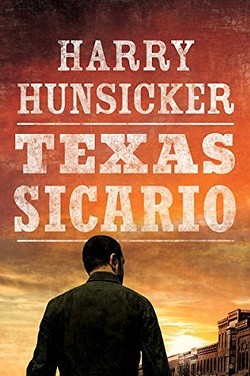Texas Sicario Embraces Crime Fiction’s Past (and Predictability)
By Max Booth III on Fri, Feb 15, 2019 at 8:23 am
Every genre has collected its share of tropes over the years. In a horror story, parents refuse to believe their children about the monster in their closet. In a romance, someone’s bound to get down and dirty in the rain. In a Western, someone will be kicked in the skull by an enraged horse.
And in crime, well... like all other genres, readers have grown to anticipate certain tropes. Consider the damsel in distress: a poor, helpless woman in desperate need of a man to come save the day. She appears in crime fiction about as often as the phrase “throbbing manhood” pops up (pun intended) in erotica. Often, the damsel in distress evolves into a femme fatale. The heroic man saves the girl, falls for her womanly ways, then finds himself stabbed in the back. Whenever I come across this turn, I pray I’ll experience something I’ve never read before, but most often that prayer goes unanswered.
Unfortunately, Dallas author Harry Hunsicker’s new crime novel Texas Sicario isn’t concerned with originality. Instead, it prefers to embrace some of those tired tropes of crime fiction’s past. Tell me if you’ve heard this one before. An older, white ex-cop with a dark history gets involved in an ongoing criminal investigation. During the investigation, he starts bonding with the wife of someone directly connected to the crime. While the man and woman don’t have sex, the sexual tension’s so thick they might as well be getting down to business. During the investigation, several law officials tell the protagonist, “Hey, you’re not a cop anymore, buddy! Quit trying to solve crimes!” To which he responds, “Make me!” Eventually things get out of hand. People die.
And the woman he’s been bonding with? She’s either a complete moron or she’s playing our protagonist or maybe both. In truth, it doesn’t matter, because whichever direction the story takes from there will only induce yawns.
Decades of “tough-guy lit” have cemented the concept of men taking charge of a situation otherwise operated by numskull villains and dimwitted dames. And Texas Sicario deals in this cliché. Plus, the book takes place in Texas, so we also get a lot of problematic takes on Latinos. Barely anybody who isn’t white can speak a complete sentence, for example. Plus, if you think the word “gringo” isn’t going to pop up approximately 10,000 times, then you’re in for a surprise.
Like a lot of suspense fiction, the book also suffers from Short Paragraph Syndrome, meaning each consists of only one or two sentences. Writers mistakenly believe short paragraphs automatically create a suspenseful atmosphere, and that’s obviously what Hunsicker is going for here, but it just doesn’t work the way he’s intending.
A good chunk of modern crime fiction has evolved into more fleshed-out stories, but it’s not rare to come across an old-fashioned plot with an old-fashioned protagonist. If that’s what you’re looking for, then Texas Sicario isn’t necessarily a bad book, just not a good one, either.
Unfortunately, not much stands out, from the predictable characters to the onslaught of laughable plot twists. There is, however, a clever if short-lived money-laundering scheme, and also the promise of a cool direction the plot could have gone with a child-assassin. But those flames are too quickly extinguished.
Stay on top of San Antonio news and views. Sign up for our Weekly Headlines Newsletter.
And in crime, well... like all other genres, readers have grown to anticipate certain tropes. Consider the damsel in distress: a poor, helpless woman in desperate need of a man to come save the day. She appears in crime fiction about as often as the phrase “throbbing manhood” pops up (pun intended) in erotica. Often, the damsel in distress evolves into a femme fatale. The heroic man saves the girl, falls for her womanly ways, then finds himself stabbed in the back. Whenever I come across this turn, I pray I’ll experience something I’ve never read before, but most often that prayer goes unanswered.
Unfortunately, Dallas author Harry Hunsicker’s new crime novel Texas Sicario isn’t concerned with originality. Instead, it prefers to embrace some of those tired tropes of crime fiction’s past. Tell me if you’ve heard this one before. An older, white ex-cop with a dark history gets involved in an ongoing criminal investigation. During the investigation, he starts bonding with the wife of someone directly connected to the crime. While the man and woman don’t have sex, the sexual tension’s so thick they might as well be getting down to business. During the investigation, several law officials tell the protagonist, “Hey, you’re not a cop anymore, buddy! Quit trying to solve crimes!” To which he responds, “Make me!” Eventually things get out of hand. People die.
And the woman he’s been bonding with? She’s either a complete moron or she’s playing our protagonist or maybe both. In truth, it doesn’t matter, because whichever direction the story takes from there will only induce yawns.
Decades of “tough-guy lit” have cemented the concept of men taking charge of a situation otherwise operated by numskull villains and dimwitted dames. And Texas Sicario deals in this cliché. Plus, the book takes place in Texas, so we also get a lot of problematic takes on Latinos. Barely anybody who isn’t white can speak a complete sentence, for example. Plus, if you think the word “gringo” isn’t going to pop up approximately 10,000 times, then you’re in for a surprise.
Like a lot of suspense fiction, the book also suffers from Short Paragraph Syndrome, meaning each consists of only one or two sentences. Writers mistakenly believe short paragraphs automatically create a suspenseful atmosphere, and that’s obviously what Hunsicker is going for here, but it just doesn’t work the way he’s intending.
A good chunk of modern crime fiction has evolved into more fleshed-out stories, but it’s not rare to come across an old-fashioned plot with an old-fashioned protagonist. If that’s what you’re looking for, then Texas Sicario isn’t necessarily a bad book, just not a good one, either.
Unfortunately, not much stands out, from the predictable characters to the onslaught of laughable plot twists. There is, however, a clever if short-lived money-laundering scheme, and also the promise of a cool direction the plot could have gone with a child-assassin. But those flames are too quickly extinguished.
Stay on top of San Antonio news and views. Sign up for our Weekly Headlines Newsletter.
Tags:

KEEP SA CURRENT!
Since 1986, the SA Current has served as the free, independent voice of San Antonio, and we want to keep it that way.
Becoming an SA Current Supporter for as little as $5 a month allows us to continue offering readers access to our coverage of local news, food, nightlife, events, and culture with no paywalls.
Scroll to read more Arts Stories & Interviews articles
Newsletters
Join SA Current Newsletters
Subscribe now to get the latest news delivered right to your inbox.















